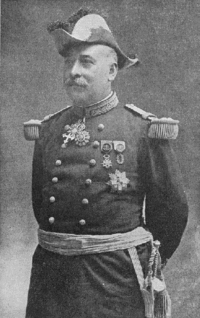- Charles Lanrezac
-
Charles Lanrezac 
Born July 31, 1852
Pointe-à-Pitre, FranceDied January 18, 1925 (aged 72)
Neuilly-sur-Seine, FranceAllegiance  France
FranceRank General Commands held Fifth Army (France) Battles/wars Franco-Prussian War
World War IAwards Grand cross of the Légion d'honneur
Grand cross of the Order of the Crown (belgium)Charles Lanrezac (July 31, 1852 - January 18, 1925) was a distinguished general of the French army at the outbreak of World War I.
Contents
Early life
Lanrezac attended the military school at Saint-Cyr in 1869 but when the Franco-Prussian War started 1870, he was sent to fight as a lieutenant. He fought with the Armée de la Loire at Coulmiers and in the campaign around Orléans. In January 1871 he was transferred to the Armée de l'Est and following the failure of its campaign, he was interred in Switzerland. By 1876 he had been promoted to captain. He graduated from the École Militaire in 1879. The following years Lanrezac served in various staff functions in the 113th Infantry Regiment and on a brigade staff in Tunesia. Lanrezac was promoted to colonel in 1902 and given command of the 119th Infantry Regiment. He became a brigade general in June 1906, commanding the 43rd Infantry Brigade stationed in Vannes. After this brigade command he was made a professor at the École Militaire. He was made a divisional general in 1911 and the following year he was made Général de corps d'armée in command of the XI Corps in Nantes. In April 1914 Lanreczac succeeded Joseph Gallieni as a member of the French Supreme War Coucil and was designated as the commander of the Fifth Army in the event of war.
World War I
At the start of World War I, Lanrezac was given command of the French Fifth Army, holding the extreme left of the French line. His command was arguably the most difficult on the Western Front; he had to meet the enveloping right-wing of the German Army that quickly steamrolled Belgium.
Although Lanrezac knew retreat to be necessary from the beginning of the war and warned against the danger of the German sweep through Belgium, his superior, General Joseph Joffre, believed that France should follow the offensive Plan XVII, regardless of what happened in Belgium, and discounted Lanrezac's warnings. With the help of the British Expeditionary Force, the French held the line in retreat even after the great defeat at the Battle of the Frontiers in 1914. His retreat after the Battle of Charleroi arguably saved the French army from decisive defeat as it prevented the much sought envelopment of the Schlieffen plan. After fighting another defensive action in the Battle of St. Quentin, the French were pushed to within miles of Paris, but the line held at the sacrifice of Lanrezac's career.
His harsh criticism of his superiors in the Staff Corps overshadowed his impressive ability to avoid envelopment by the Germans and he was replaced by Louis Franchet d'Espérey just before the opening of the First Battle of the Marne. Lanrezac stayed in retirement for the rest of the war, refusing an offer to be re-employed in 1917.
The city of Paris honored Lanrezac by naming a street after him near the Place de l'Étoile. The Rue de General Lanrezac, one block from the Arc de Triomphe, connects Avenue Carnot with Avenue MacMahon.
References
- Evans, M. M. (2004). Battles of World War I. Select Editions. ISBN 1-84193-226-4.
- Tuchman, Barbara W. (1962). The Guns of August. Ballantine Books- New York. ISBN 0-345-38623-X.
External links
Categories:- 1852 births
- 1925 deaths
- French generals
- French military personnel of the Franco-Prussian War
- French military personnel of World War I
- French military personnel stubs
Wikimedia Foundation. 2010.
